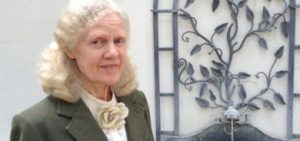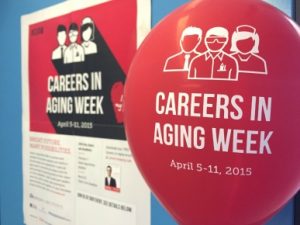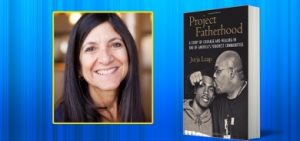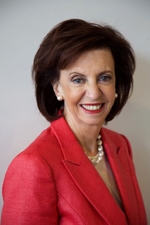Fellowship Donor’s Life is a Window on History With her support of an endowed fellowship for urban planning students focusing on transportation, Pat Shoup hopes to demonstrate the power of education

By Alejandra Reyes-Velarde
UCLA Luskin Student Writer
“I have very happy memories of my childhood in Northern Ireland,” Pat Shoup says. “The way I think of my life is before the U.S. and after I came to the U.S., in two distinct parts.”
Though she remembers her childhood fondly, playing field hockey, becoming head girl of her high school, and obtaining the highest honor as a Queen’s Guide in the equivalent of Girl Scouts, her environment had always been sensitive to the history of the “troubles” that partitioned Ireland in 1921. Although she loved Northern Ireland, which was peaceful when she grew up there, she chose to go to the University of St. Andrews, Scotland, and remembers feeling lucky to study in such a beautiful medieval town.
A year after graduating, Pat met a young American named Donald Shoup when her brother invited him to their parents’ house in Northern Ireland. The whole family fell in love with Donald, including Pat. After he returned to the U.S., she and Donald wrote to each other for two years. In 1964 they arranged to meet again in Heidelberg, Germany, where she was teaching English at a Berlitz School. That summer they became engaged, and in 1965 she emigrated to the United States, a journey that would mark a turning point in her life and career.
When she landed in New York, Pat Shoup was 25 years old and excited to embark on a new journey, a journey that began with a Humber bicycle constructed for her by Donald from a kit.
Having left everything behind, Shoup said she was in need of a job and attempted to continue her teaching career by taking a summer MAT course at Yale. After struggling through a temporary job trying to teach American history, she realized teaching was not for her.
In 1968, Shoup and her husband moved to California when when he won a postdoctoral appointment at UCLA, and she began her career as an editor for academic journals by working freelance for Sage Publications. When the University of Michigan appointed her husband an assistant professor, she worked for the university press in Ann Arbor and was the editor for the 1970 Survey of Consumer Finances. When the couple moved back to Los Angeles, Pat worked on campus for various journals, including Law & Society Review at the UCLA Law School and The Journal of Symbolic Logic, as well as doing freelance jobs for the university press.
Though she has edited numerous academic journals, Shoup’s passion for writing lies in fiction and poetry. Some of her poetry has been published, and one of her poems was published in a collection of works selected by Ted Hughes and Seamus Heaney.
“Writing is the thread that seems to run through my life,” Shoup says. “I wrote letters every week to my parents (when I came to the U.S.). You couldn’t just phone somebody. My life has been strung along the line of writing letters to people who mattered most to me or my own ambition to be a writer.”
Despite veering away from her own ambition of becoming an author, Shoup remains interested in writing fiction and a memoir. She took a UCLA extension course on memoir writing and says she has written fragments of a memoir that she wants to complete one day. “I want to remember what it was like in Northern Ireland when I was young because it was such a happy place then, not as the media later represented it. I was terribly upset by what happened,” she says. “I would like to let people know that it wasn’t always like that.”
Some of her work, including a published short story “Times of Trouble,” has been inspired by her feelings of displacement after the Northern Ireland “troubles” reignited in 1969. Shoup remembers being shocked to learn that one place she remembered fondly from her childhood was later the scene of Lord Louis Mountbatten’s assassination. “During the Second World War, my parents would take us for summer holidays to the west of Ireland to Mullaghmore, where I learned to swim in the harbor,” Shoup says. “Years later, that was the place where Mountbatten (Prince Philip’s uncle), who owned a castle there, was blown up by an IRA bomb planted in his boat. I heard the news in 1979 on the radio here in Los Angeles. I felt as if someone had hit me with lightning.”
Shoup said she and her husband share a passion for writing and editing to produce the best possible work. “You need a lot of things to keep you together and interested in each other,” she said. “I’m very proud of him and we have worked together on his writing because it’s so important to both of us.”
Pat and Donald Shoup edited The High Cost of Free Parking together and she has played a key role in its success. She has also played a role in funding the Donald and Pat Shoup Endowed Fellowship in Urban Planning.
“I care about how students can be helped because we both believe that education is the most important thing that young people can get,” she said. “We decided a long time ago we’d like to leave some money to help future students, and Donald’s retirement seems like a good time to do that. What amazes me is how many other people have contributed so generously to the fellowship, and we are both extremely grateful to them all.”




